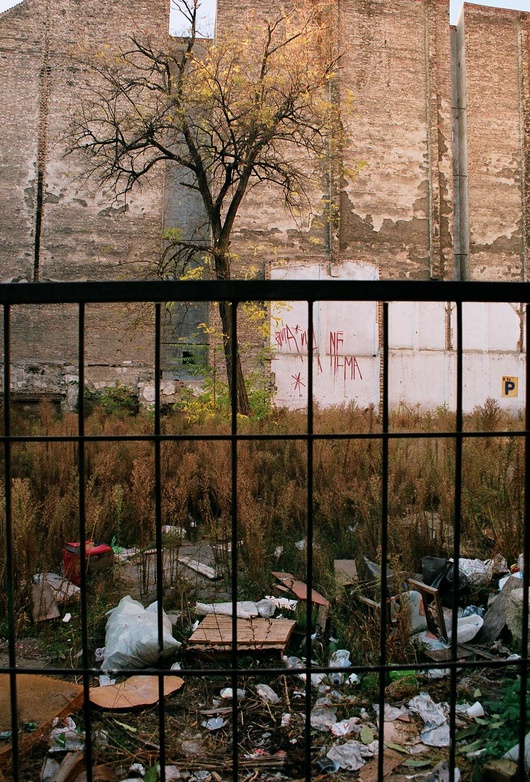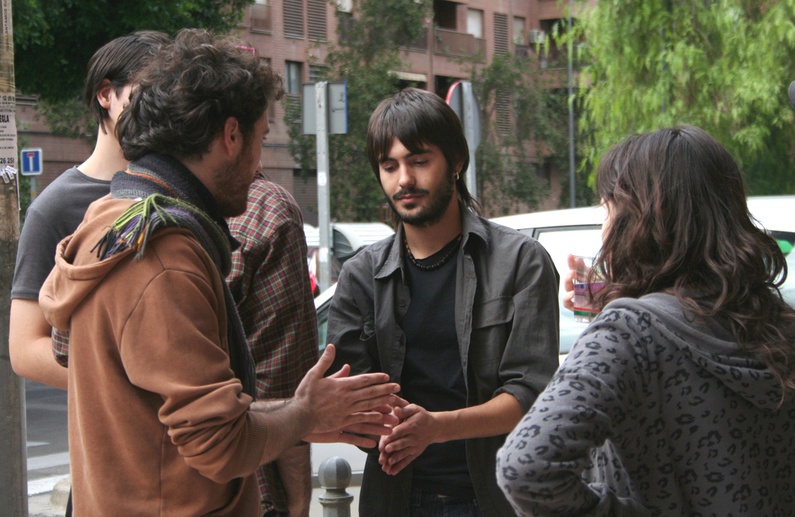
Budapest: Always at odds with the Roma?
Published on
Translation by:
 Danny S.
Danny S.
The recent European Elections confirmed the shift towards the right in Hungary over the recent years. Not really a good omen at any rate for the Roma, who suffer from discrimination. However, some key figures are rising against the trend, trying to help the minority out of the poverty trap.
Antiziganism is the correct term for hostility direct toward the Roma people. Across Europe, the Sinti and Roma people have been affected by the issue for centuries; they're considered poor, criminal and as modern vagabonds. In Germany and France, people are becoming increasingly riled up about the growing number of immigrants from the East. Many migrants in Hungary, Romania and Bulgaria are fleeing due to marginalisation and the lack of prospects.
Prejudice, joblessness and ancestry
 In the 8th borough of Budapest, the plaster building façades are crumbling. On this hot summer day, Roma are loitering on park benches as if having been beaten to death. Signs of despair spread across their faces; they look worn out and carry grimy clothes. That's how it is everyday. Almost none of them have work: 70% of Roma nationwide are unemployed. That's considerably more than ethnic Hungarians who the Roma people view as loud and uncivilised. This is part of the reason why they have such difficulties finding a job, despite having citizenship and being able to speak Hungarian. "It's a vicious cycle based in prejudice, poverity, joblessness, ancestry and lack of education," says Alexandra Szarka, as she describes the meager opportunities for Hungary's largest minority. The 23-year-old studies social work and helps neglected Roma children on the side. In association with the project Chance for Children Foundation, she mentors those who wouldn't otherwise be able to pull themselves out of this vicious cycle.
In the 8th borough of Budapest, the plaster building façades are crumbling. On this hot summer day, Roma are loitering on park benches as if having been beaten to death. Signs of despair spread across their faces; they look worn out and carry grimy clothes. That's how it is everyday. Almost none of them have work: 70% of Roma nationwide are unemployed. That's considerably more than ethnic Hungarians who the Roma people view as loud and uncivilised. This is part of the reason why they have such difficulties finding a job, despite having citizenship and being able to speak Hungarian. "It's a vicious cycle based in prejudice, poverity, joblessness, ancestry and lack of education," says Alexandra Szarka, as she describes the meager opportunities for Hungary's largest minority. The 23-year-old studies social work and helps neglected Roma children on the side. In association with the project Chance for Children Foundation, she mentors those who wouldn't otherwise be able to pull themselves out of this vicious cycle.
After all, although Hungary has a public school system, the differences between individual schools is immense. In socially weakened city districts, standards are considerably lower than average. That's why most middle class parents want to avoid sending their children to those schools. Therefore, the Roma are held back and remain isolated. Should one of them make it to the better schools, then they often face discrimination. "In reality, there would be opportunities for them, but they don't get the instruction they need," explains the involved student. "Sometimes they're put in classes with 100% Roma. Some headmasters are proud of it, but that only makes the whole situation a lot worse and is actually against the law." Roma children from the countryside are sometimes even placed in special education classes.
In the jesuit college of budapest
What's also problematic is that the teachers are almost exclusively educated in elite universities and aren't used to the young people from the lower echelons of society that do not receive the same level of education. Zoltan Balog, Minister of Human Resources, suggested providing remediation courses specifically for the Roma. After all, they are equal before the law, but that's seldom the case on the ground. If such a political push will change something remains to be determined.
 The topic of antiziganism is a taboo in Hungary and few people speak openly about it. Some are already saying, that it's like in the 60s because no one feels confident to express their opinion, out of the fear that they'll lose their job. That's why it's difficult to find people at all who are willing to talk about the topic. Even the Roma feel embarrassed about their situation and remain silent out of pride. Istvan Antal is an exception. He's the acting manager of the Roma Jesuit College in Budapest. It's also located in the 8th borough and stands out from the district's rows of houses that are falling apart. The thick walls surrounding the newly renovated entry keeps out the muggy heat; classical music can be heard as you walk in. Today, a benefit concert is being held for the even more impoverished Roma in Romania. Their people are known for their musical traditions; a career as singer or instrumentalist is often the only way to the top.
The topic of antiziganism is a taboo in Hungary and few people speak openly about it. Some are already saying, that it's like in the 60s because no one feels confident to express their opinion, out of the fear that they'll lose their job. That's why it's difficult to find people at all who are willing to talk about the topic. Even the Roma feel embarrassed about their situation and remain silent out of pride. Istvan Antal is an exception. He's the acting manager of the Roma Jesuit College in Budapest. It's also located in the 8th borough and stands out from the district's rows of houses that are falling apart. The thick walls surrounding the newly renovated entry keeps out the muggy heat; classical music can be heard as you walk in. Today, a benefit concert is being held for the even more impoverished Roma in Romania. Their people are known for their musical traditions; a career as singer or instrumentalist is often the only way to the top.
Almost Celestial
Because the status quo should be dismantled, Antal has been campaigning for Roma students since 2004. After all, they'd be a lot more accepted in society if they had a degree: it's the certificate that not only substantiates education, but also integration. "We want to help lift them into the intellectual circles of Hungary, thereby strengthening their identity as Hungarians and Roma." This is how he understands the role of the college. In other words, it's the next step for those who have made it in school. When they've graduated and been accepted to university, then they'll be able to apply for projects that will provide them with living space and supplementary courses.
"Almost all of our 29 students have financial or other problems," reveals Antal. Many of them come from the countryside where they don't even have access to electricity and water, and where they lived in broken families. In contrast, the circumstances of the Roma settlements of Budapest seem almost celestial. They all would have suffered from discrimination, but they learned how to deal with it. "Now it doesn't matter to them anymore; there isn't discrimination in the university," says the young man as he lists the successes of the institute. "Through their experiences they serve as role models and help others. They even organised the concert by themselves; they're old enough to be able to do that," he says proudly.
denied, despite social mobility
Applicants don't have to be religious to be accepted; the institute is open to every type of world view. Every year the number of students increases; they will soon reach capacity. Apart from the European Union, which will support the college until 2015, the Hungarian government also sends subsidies their way. These measures were implemented on the national level, as well as the European level, when Hungary held the presidency of the Council of Europe, with the aim of bettering the situation of the Roma people. In Hungary, the government focuses primarily on Roma people who want to learn and thus, are at least partly integrated into society. Everyone else will remain in poverty or have to consider a journey to the West. But despite EU mobility, they'll continue to be denied. After all, Szarka and Anatal don't have room for everyone.
THIS ARTICLE IS PART OF A SPECIAL SERIES DEDICATED TO BUDAPEST AND CARRIED OUT IN THE FRAMEWORK OF AN EU PROJECT, INTIATED BY CAFEBABEL.COM AND SUPPORTED BY THE EUROPEAN PARLIAMENT AND THE HIPPOCRÈNE FOUNDATION.

Translated from Budapest: Immer auf die Roma?



